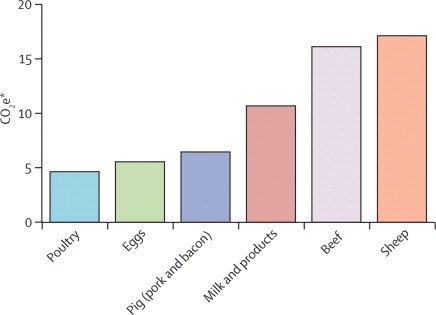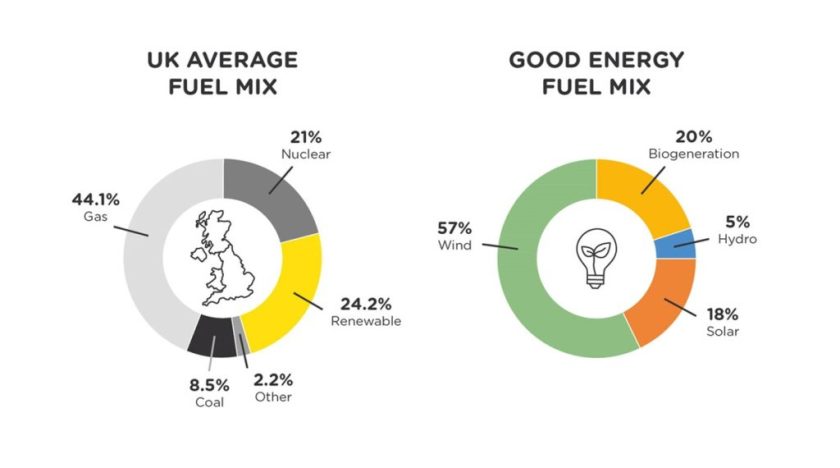Yesterday we heard the heartbreaking news that restricting climate change to 2.0 degrees, which we weren’t on track to achieve anyway, won’t be good enough to prevent the worst damage. I wrote an article delving into the details.
Here is something more positive: a guide to what YOU can do about climate change, starting right now. Some of the things are really easy!
The short-version is: go vegan, get a veg box, be really rude to people to by air-freighted food, drive less, walk more, switch to good energy, wear jumpers and insulate stuff. All of these things are good for your health and for the health of other people too! Kaboom!
Change your food
Go Vegan
 Go vegan, vegan-ish or reduce your consumption of animal products. How? Start here. Why?
Go vegan, vegan-ish or reduce your consumption of animal products. How? Start here. Why?
Because, according to sources referenced in The Lancet [1]:
- If we ate 30% or more less meat, the we would all be healthier e.g. rates of heart disease would drop by 15%
- Agriculture alone accounts for about 10–12% of global greenhouse-gas emissions
- A further 6-12% of greenhouse gas comes from agriculturally-induced change in land use (deforestation, overgrazing etc)
- The farming of animals accounts for 80% of all agricultural greenhouse-gas emissions
- So, roughly, if everyone gave up meat we would cut the worlds CO2e by 12.8-23.2%
- Plus, you know… animals that are just as clever as your dog / kid won’t be killed all the time…. Just sayin’…

Also see this in the Guardian and remember – your pets can go vegan too!
Buy local or get a veg box
In the UK:
- 95% of our fruit comes from abroad
- Half of our vegetables are imported
However, if you buy from Riverford – who we love – then 72% of your veg will be from the UK. Things only come from further-afield if it’s more efficient (e.g. early/late Tomatoes) or if they don’t grow here (e.g. Oranges and Bananas).
For those who are really determined for 10/12 months of the year they also do an amazing 100% UK veg box.
Also, a veg box, delivered once a week, is better than driving to the shops [3]
Also, check out this food miles calculator – might be a fun project for kids on a rainy weekend!
Be rude
“Whilst only 1% of food is transported by air, it accounts for 11% of carbon emissions” [4]
It just needs to become socially unacceptable to buy air freighted food. Have a go at your friends when they do it. Make a complaint at the supermarket. Be rude, pass it on!
Change your ride
Drive less
Air pollution exposure kills – it kills thousands every year in the UK. According to the Lancet [2] In the EU there were 2002 years of life lost in 2010, per million people. So in one year, people living in the UK lost 132,132 years off their collective lives because of pollution, through heart and lung disease and cancers.
Transport, in the UK, is now the most polluting thing we do in terms of greenhouse gas, accounting for 26% of all our emissions. These emissions must fall by 44 per cent before 2030, and that’s just to keep the UK on track to meet the 2% goal which has just been thrown out the window!
Go electric
If you can afford to switch to an electric car, then things are starting to look good on that front – there are several vehicles with a 300+ mile range on the market already. Or if not…
Little changes that make a big difference
- Try and work from home more often
- Use public transport
- Walk more, especially replacing shorter journeys
- Get a veg box – home delivery is more efficient than driving to the shops.
Change your energy supplier
We can personally recommend Good Energy. Seriously. They are fab.
100% of their electricity comes from sun, wind and wave. How ever much you use – they pump at least the equivalent into the national grid from a renewable source.

They have always been cheaper – we have checked on switching sites several times over the years. Their prices have risen less often too (because the renewables market is more stable than oil). That and local UK based customer support, and nice yellow coloured electricity bills – what’s not to like!
Good energy own 7 Solar farms and 2 wind farms, and also buy energy from small scale independent renewable projects.
Their gas is eco-ish too, 6% of it comes from biomethane, that’s gas produced in the UK from organic matter like manure and sewage. The rest is offset by through verified carbon-reduction schemes that support communities in Malawi, Vietnam and Nepal.
Change your house
Get free stuff
First of all, check out these grants for making your house more eco-friendly. This means, warmer, cheaper to heat, more valuable to sell and often safer.
Wear a jumper
Try, as a mindful mantra, to put on a jumper when you are cold, rather than turning up the heating right away. A good jumper will save you money and make you feel all…. snugly!
Insulate
Insulation can be anything and everything from doing your loft space (we really like this insulation product btw) to putting some cheap insulation widgets around your hot water pipes or getting some thicker curtains.
Sometimes little things can make a big difference – for example, our house was noticeably warmer after putting some heat reflecting panels behind radiators. There are some great tips at http://www.superhomes.org.uk/
Take control
We are currently saving up to get genius hub – heat genius installed. You can have a thermostat in every room and automatic controls on every radiator. This means you can heat certain rooms at specific times of day, but not others. You can control it all from your phone too! I think it’s perfect for people who work from home.
However, if you tend to either heat the whole house or not at all (for example If you work 9-5 and have kids etc too) then a simpler solution might be just as good, and cheaper.
Go all electric
If you are faced with a boiler replacement situation, please consider an electric combi-boiler rather than gas. They are a little more expensive to run – but only because gas is currently cheaper than electricity. They are much more efficient, cheaper to install and safer to use. If you have solar panels, then it’s a really great combination.
References
[1] Smith P, Martino D, Cai Z et al. Agriculture. Cambridge University Press, New York, NY; 2007
[2] https://www.thelancet.com/journals/lancet/article/PIIS0140-6736(09)61715-3/fulltext
[3] https://www.sciencedaily.com/releases/2009/02/090202113553.htm
[4] http://www.pollutionissues.co.uk/food-miles-environmental-impact-food.html

Hiya Anna and Joey. We have always used Ecotricity as they are 100% electricity and gas and build own wind turbines etc. Why is good energy better? Only wondering as always looking to find something better. Thanks lovelies. Hope you both ok.
Well, back in the day when we first bought electricity for ourselves, Ecotricity weren’t 100% renewable and good energy were, so that’s why we chose them. Ecotricity had a focus on buying from non-renewable sources and investing the profits in their own windfarms but Good Energy at first just purchased renewable energy from others and made less money. Now they both own a lot of renewable infrastructure themselves. We looked at switching to them a few times over the years by Ecotricity were always more expensive.
Zoom forward to now, there probably isn’t much difference environmentally, but I think Good Energy are a smaller company and owned by a group of people and customer share holders (including the guy who owns ecotricity) where as ecotricity is owned by one person. I don’t much like the guy who runs ecotricity on a personal level, his ex-partner struggled to get any money out of him to raise the child they had together. However, the one downside of Good Energy is they don’t do things like smart meters yet, which is frustrating.
So, all in all, neither is probably better, it’s just about personal choice I guess 🙂